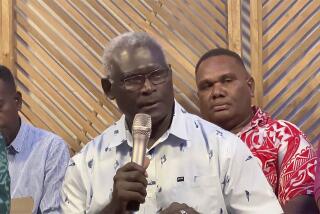Somali prime minister resigns in leadership dispute
Reporting from Cairo and Mogadishu, Somalia —
Following months of political bickering in a country battling a relentless Islamic insurgency, Somali Prime Minister Omar Abdirashid Ali Sharmarke resigned Tuesday as fighting rattled across the seaside capital of Mogadishu and talks got underway to form a new government.
Sharmarke’s decision ended a dispute between him and President Sheik Sharif Sheik Ahmed over a draft constitution for the nation, which is mired in civil war against Al Qaeda-backed militants who control all but a few blocks of the capital. The prime minister’s departure is not expected to significantly change the country’s course, but it gives the Western-backed Ahmed a chance to assemble a new Cabinet.
Despite help from more than 6,000 African Union troops, the transitional Somali government, with an army of underpaid and discouraged soldiers, has been unable to defeat militants of the Shabab movement. The insurgents have killed scores of aid workers and carried out suicide bombings and political assassinations, such as an attack on a hotel in August that killed at least 31 people, including six lawmakers.
Sharmarke told reporters Tuesday that he didn’t want his differences with the president to jeopardize security.
“After considering the current insecurity in the country and the outstanding political crises between me and the president, I have decided to resign my position as prime minister for the sake of my nation’s survival,” he said. “It’s not a secret that me and the president do not see eye to eye. We had a bit of a political storm.”
Ahmed, who had been orchestrating an attempt to oust the prime minister in a vote of no confidence in the parliament, accepted Sharmarke’s resignation, calling it a “courageous decision.”
The animosity between Sharmarke and Ahmed had been preoccupying the government for months. In May, Ahmed announced that he had fired Sharmarke. Days later, after questions arose over the legality of removing the prime minister, Ahmed reversed his decision.
Sharmarke resumed his duties, but new tensions arose this month over differences in adopting a new constitution. Ahmed and Sharmarke, whose father, Abdirashid Ali Sharmarke, was president when he was assassinated in 1969, went for weeks without meeting or speaking over the phone.
There has been confusion over the job descriptions of the two positions. The president has the power to appoint the government, including the prime minister, based on the approval of the parliament.
“There was a strong disagreement between both sides over a draft constitution, and there may be other issues between them,” Mahad Mohamed Istiila, an official in the Information Ministry, said after the resignation. “The president and the premier haven’t been working together for the past months.”
Mohamed Mustaf Ali, a Somali political expert, said Sharmarke may have stepped down to avoid becoming a scapegoat for the country’s deteriorating situation: “The government has a short time of maybe a year or less to stay in power. It’s clear that every official wants to escape blame over the nation’s security.”
The U.S., which provides weapons and training to the Somali army, is concerned that Somalia is becoming an Al Qaeda stronghold from which militants could launch attacks across the Horn of Africa. In July, Shabab claimed responsibility for twin bombings that killed 76 people watching the World Cup soccer championship at a restaurant and rugby club in Uganda. The attack, the militant Islamic group said, was in retaliation for Uganda sending soldiers to the African Union force bolstering Ahmed’s troops.
Hundreds of thousands of Somalis have fled their homes in recent years, and Mogadishu has tumbled into a shifting war zone. The country hasn’t had a stable government since 1991.
Mohammed is a special correspondent.
More to Read
Sign up for Essential California
The most important California stories and recommendations in your inbox every morning.
You may occasionally receive promotional content from the Los Angeles Times.










